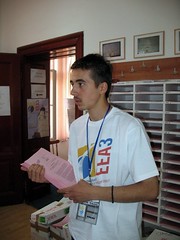It will be world hunger day in about 10 days and I read this interesting review in the New Statesman. The book's called Stuffed and Starved: Markets, Power and the Hidden Battle for the World’s Food System and is by Raj Patel. The book looks at both obesity and starvation from a politcal and economic perspective. Maybe one day I'll even read the real thing and not just the review.
Sunday 30 September 2007
Sunday 23 September 2007
Season of mists and mellow fruitfulness
Autumn seems like the right sort of time for these sorts of reflections - nature in the northern hemisphere blooms with bright yellows, reds and oranges, the glorious colours of leaves dying before falling to nourish the soil. The ground would seem to lie fallow and yet the buds of a new spring are already presnt on the branches as they become bare.
As summer and autumn moves towards winter and hours of daylight diminish in the northern hemisphere, this is also the time in many of our church calendars when we remember, celebrate and reflect on what those who have died before us have given to us - All Saints and All Souls' day on 1 and 2 November, remembrance or armistice day on November 11, Buss- und Bettag in Germany towards the end of November and Totensonntag now more usually called Ewigkeitssonntag. (The Sunday of the dead as opposed to eternity Sunday in case you're interested in these arcane translation matters.) And this mellow reflective season is also a time both of harvest festivals and of the new academic year - endings and beginnings, a truly fruitful time.
So somehow the beautiful falling leaves also say - in the midst of death we are in life. Remembering those who have gone before is also a powerful way of saying we are not alone on this strange journey called life.
Publié par Jane à l'adresse 20:59 1 commentaires
Friday 21 September 2007
Grieving
My best friend's mother died very suddenly last week. A few days earlier the family had held a fiftieth wedding anniversary party for her and her husband. She died just a day before the actual anniversary, leaving Janet and her father greeting the many friends who turned up at the house with the sad and unexpected news.
"In the midst of life we are but a hair's breadth from death" goes a line I seem to remember from a funeral liturgy (can't find a link to it though so probably my mind is playing tricks on me). Life is so very fragile and can end without warning at any moment.
Grieving is so exhausting and all consuming too. We try to prepare ourselves for the death of our loved ones yet when that dreadful time comes it leaves us somehow both stronger and more vulnerable than we had ever expected. Stronger because despite everything we manage to cope, get through and manage. More vulnerable, because even years and years later when we mention the loved one's name our voice may still break or our eyes mist over in a way we cannot quite control. Somehow grief is always recent.
For me it has been a privilege over the years to be with and accompany people at this very raw time in their lives; walking to the cemetry, finding words that begin to express loss, celebrating what was unique about the person grieved for. It also helped me with my own grief, when my father died or close friends, but in the end nothing prepares you for you own grief. Olivier Abel - a French Protestant philospher and theologian - has said that it is sometimes easier to share pain or grief rather than happiness. There is often a wave of sympathy expressed when someone dies, we have all experienced something of the tragedy of loss in our lives, the grief others are going through reminds us of our own grief and even rekindles it. It's quite a profound bond between human beings.
Professor Robert Winston began one of the brilliant series he did on the BBC about the human body, sitting on a small boat in the middle of the river Thames in London hauling buckets of water on board. It didn't seem to have a great deal to do with the subject of the documentary. Then surrounded by many buckets in the bottom of the boat, he said "These buckets represent the amount of tears each of us will cry in an average human lifetime."
The message was simple, tears are what makes us human...
Publié par Jane à l'adresse 22:55 0 commentaires
Painting peace in the chapel
 We have been getting up rather too early for my liking this week but the final spurt for the doctorate kick starts our days at the moment. The plus side has been that the early morning sun rises behind the alps have been quite beautiful, the snow-topped mountains standing out black against a pale sky streaked with red. It can almost make you feel it's worth getting out of bed.
We have been getting up rather too early for my liking this week but the final spurt for the doctorate kick starts our days at the moment. The plus side has been that the early morning sun rises behind the alps have been quite beautiful, the snow-topped mountains standing out black against a pale sky streaked with red. It can almost make you feel it's worth getting out of bed.
This morning it also meant that I was in the chapel at the ecumenical centre much earlier than I think I have ever been in there before. The angled light coming in through the windows and wood was quite spectacular.
When the night has been cold but the sun shines strongly it is almost as if the chapel is speaking, the wooden cladding makes quite a noise as it expands with the rising sun. I find the noise quite comforting, as if the chapel knows the words to the prayers even if I don't, praying even if noone is there. Hmm I suspect that is not a very Protestant sort of musing!
Today we moved around, walking to different stations or specially created side chapels, keeping silence and singing, listening to the call of the drum and finally painting the word peace.
Wandering around and discovering such a familiar place from new angles was interesting. I'd never really appreciated quite how lovely the depth of light through the stained glass is until lunchtime today. By midday the chapel was almost like a greenhouse and that affected our singing too, I'd forgotten how much temperature affects how flat or sharp you sing.
And the peace paintings were fun.
Publié par Jane à l'adresse 21:15 1 commentaires
Thursday 20 September 2007
Praying for peace
So it's the International Day of Prayer for Peace
Earlier this week Bishop Duleep from Srilanka preached a pithy and heartfelt sermon in the chapel of the ecumenical centre in Geneva on the issue of peace. He used as an image the fact that in Srilanka people know that if they really want to find water all they have to do is dig, but they don't know how deep they are going to have to dig. He likened this kind of digging to the hard groundwork that needs to be put in and maintained when working for peace.
Earlier in the week we had reflected on violence against women and children and placed stones with names on them on the steps of the altar. We were challenged and asked whether we really believed it possible to find the image of God in the violated and mistreated and if so, what the consequences should be for our own witness to overcoming violence.
At our prayers for peace tomorrow we will reflect on how we can overcome our violence and become living stones and channels of peace.
Is praying just a cop out, a way of trying to salve one's conscience while avoiding the hard work of digging for peace? Sometimes I wonder about that, other days I'm convinced that praying may be the only useful thing I do each day. Coming from a Calvinist I think that could be taken as a pretty ringing endorsement!
Publié par Jane à l'adresse 23:04 0 commentaires
Sunday 16 September 2007
Poverty and wealth
Apart from Sibiu itself most of what we saw of Romania was from the comfort of a very modern train. I'm always interested in rural landscapes. I grew up in a house with views overlooking miles of rich farmland in the heart of England. Cows or pigs from the neighbouring field would often break into our garden and as a young child I would wander around in a nightdress and wellington boots early in the morning trying to help herd them back to their field.
The countryside we were travelling through in Romania was varied; rich and fertile in parts but with alot of sheep farming on the higher poorer ground. For the most part the farming we saw seemed to be fairly labour intensive - lots of hand-piled hayricks which I have rather blurred photos of taken from the train. I noticed lots of small farmyards, even on the outskirts of towns and cities.
On an earlier long journey around Eastern Europe I remember helping to feed the pastor's pig which was kept in a shed in the back yard of a house in the centre of the city of Rovno in Ukraine. The pig would recycle food leftovers and then be slaughtered and feed the family through the winter. I wondered how many of the sheds I could see from the train also housed pigs to feed families through the coming winter. It's certainly a more ecological way than buying pre-packed slices of meat from the supermarket, not sure what my neighbours would say if I tried something similar in my pocket handkerchief garden though!
Alongside new and not so new cars there were also horse drawn carts, both in the centre of Sibiu and more so in the countryside; evidence of the large gap between rich and poor, haves and have-nots, society travelling at different speeds. Easy for me to notice and meditate this from the safety of my 5 star hotel or Geneva-based lifestyle. Easy too not to notice the equally large gap between rich and poor where I live.
Publié par Jane à l'adresse 19:22 1 commentaires
Migration matters to me
Sibiu was a fascinating place in which to discuss migration. Speaking over lunch on the first day with Torsten Moritz from CCME, the Churches Commission on Migrants in Europe, it was interesting to hear about the different waves of immigration and migration that Sibiu had experienced and is still experiencing. Torsten is German and his wife Romanian. Looking through Bishop Klein's book about the different churches in Sibiu I was intrigued to discover that it was only late in the 18th century that the first Reformed and Orthodox churches were built in the city - following an act of toleration. Shifting national borders, shifting religious allegiances, shifting politics and empires are very much part of Europe's history and present - think of Kosovo or Montenegro, Europe's most recent state. Shifting ideas too about what kind of people and what kinds of religion could be officially sanctioned.
The story about the act of toleration leading to churches of different confessions being built in Sibiu made me think about how it was only in the 19th century that Roman Catholics were allowed to be elected to the House of Commons in Britian and that it was not until after 1871 that non-conformists, Jews and atheists were allowed to attend Oxford or Cambridge universities. In France huge waves of migration followed the revocation in 1685 of the Edict of Nantes, the act of toleration which Henri IV had tried to put in place in 1598 , and it was not until the 19th century that Protestant churches and Jewish synagogues began to be built again in France. In many cities, like Lille for instance, the "temple" (the French word for a Protestant church!) and the synagogue are in the same part of town. Today it is often the building of mosques that is an issue. Religion being very closely identified with the regime led to many statues in France's Catholic churches being destroyed or decapitated following the 1789 revolution.
People move around through choice or by force, and sometimes our ideas, our understanding and our ability to welcome the stranger don't move forwards positively at quite the same speed. Refugees, asylum seekers, economic or political migrants, people fleeing for their lives, looking for work, seeking education, exile or simply looking to broaden their horizons - these are our fellow human beings, yet often we feel threatened by them or by the idea of them.
The issue is one of the key areas where churches, or perhaps I should particularly say church leaders, try to speak out and act in favour of those suffering as a result of restricitive and unjust policies. Simon Barrow has written on the issue in the comment is free section of the Guardian, I find the comments following what he has written really frightening.
Migration and integration means coping with change and change can be destabilising for both host and migrant. The German Rheinland Church, the Reformed Church of France and the Cepple (the conference of the Protestant churches in southern Europe) are holding their bi-annual meeting in Lisbon on "How migration is changing the face of our church communities".
All my life I have been a semi-invisible migrant or immigrant - only the "z" at the end of my name might give pause for thought. My father, his parents and sister left Hitler's Germany in April 1939. They got into Britain because Kathleen Freeman, an evangelical Anglican, founder member of the Council of Christinas and Jews and key campaigner in the Save the Children Fund, opened her own home to German-Jewish refugee children and signed the immigration papers for my father and aunt. My grandmother got in because Quakers signed her forms and my grandfather because his feisty sister Helene Hurwitz was already in London and sat in Sir Stafford Cripps office until he signed her brother's papers - "My brother is a lawyer so are you, you will sign his papers."
In the post-war years my father and his sister delighted in George Mikes' How to be an Alien
particularly when remembering the intense embarassment of travelling on the Underground with their grandmother speaking very loudly in German during the war. Aged 15 and 17 when they left Berlin for London neither of them completely lost their German accents.
A second generation immigrant in my homeland, I have become a migrant worker but a very privileged one, travelling each day from my adopted homeland in France to my place of work in Switzerland - a huge distance of about 2km! And of course despite occasional compliments to the contrary I have not entirely lost my accent either.
And if I could choose a hymn to accompany this blog it would definitely be "break the bread of belonging" by Brian Wren. You can find it in Praising a Mystery the words and the music are wonderful.
Publié par Jane à l'adresse 11:48 0 commentaires
Taking the assembly home - what future for ecumenism
In some of the round up stories following EEA3 some frustration and impatience is being expressed with the way these sorts of meetings take place. Bishop Sturm from Austria speaking with epd Ö said that he wished discussions and debates in Sibiu could have been "clearer and more intensive". Sturm is the Chair of the Austrian Council of Churches and said he had become impatient "with the ecumenical caravan coming together in order to give greetings and mention earlier discussions". He added that whenever participants did actually manage to say something a great deal of impatience could be felt.
It's also clear though, both from what Sturm says later on in the same interview and from conversations I've had with some of the participants, that for many of the national delegations preparing for and experiencing the assembly together has really given a new depth, intensity and impetus to their ecumenical relations. Protestant, Orthodox and Roman Catholic delegates from France all wrote their impressions in an ecumenical blog. Antoine Arjakovsky from France and Ukraine said in one of the articles sent by email he has written that there seemed to him to be a new and large measure of ecumenical consensus on social ethics. He wrote interesting articles from Sibiu which can be found on his blog and elsewhere if you can read in Ukrainian and French.
In the press room, in the press conferences and over beer in the evenings I repeatedly heard questions or rather statements about ecumenism not having a future. Maybe this was journalistic frustration about there not being a "big" story to go after. Perhaps the Sibiu meeting has proved that top-down ecumenism, with very little room for input from groups and campaigns, simply doesn't create the right kind of energy for Christians in Europe living in very diverse situations. Yet I sensed that the real work of the assembly took place in the afternoon hearings and in the regular prayer and worship that particpants joined in together.
For me the real questions are did the churches really want this assembly; are European Christians interested in ecumenism; what sort of ecumenism do we want? I suppose I wonder about a sort of hit-and-run ecumenism where everyone turns up and says their set piece, sets up their "profile" to use Bishop Wolfgang Huber's term - but do we listen to one another anymore, do we even feel able or willing to give ground, to learn, to change?
Publié par Jane à l'adresse 09:28 0 commentaires
Saturday 15 September 2007
The European Christian Environmental Network
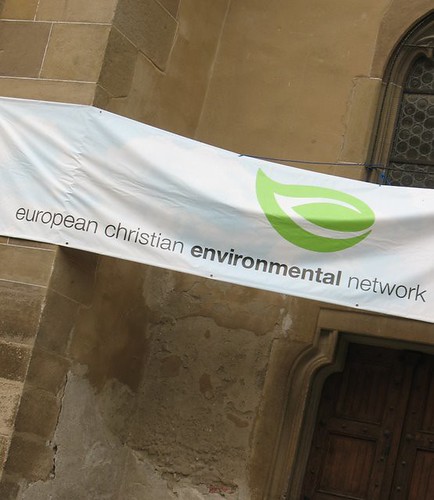 I woke up this morning to news on the radio that because of melting ice the North west passage through the Canadian Arctic is open and plain sailing for the first time since records began.
I woke up this morning to news on the radio that because of melting ice the North west passage through the Canadian Arctic is open and plain sailing for the first time since records began.
This at last galvanised me into writing something about Sibiu and climate change. On the EEA3 website there's a rather slow link here which takes you (after a wait - sorry) to a page giving ideas about how to offset the environmental impact of travelling to Sibiu particularly by air. The European Christian Environmental Network (ECEN) has been working on environmental issues for many years. There's lots of interesting stuff on the website including a dossier on church environmental management.
This commitment to the environment is part of the conciliar process and became visible as a result of the first European Ecumenical Assembly in Basel. Taking this commitment seriously should be part of the ecumenical pilgrimmage to and from Sibiu - many participants at EEA3 said that the assembly would actually only begin as people took their experiences home. Archdeacon Colin Williams, general secretary of CEC kept repeating that he hoped people would return to their local churches and "make a nuisance of themselves" by trying to incarnate the ecumenical spirit and message of Sibiu.
At the closing act on Sunday morning, following worship in their own confessions, participants gathered to the uniting sound of all of the churches' bells ringing out over the town. A lime tree was planted by Metropolitan Gennadios, Bishop Paglia, Elisabeth Fischer and Bishop Margot Kässmann as a sign of lasting hope.
ECEN proposes trying to finance a wood in Romania, near Sibiu as a way of offsetting the carbon impact of travel to the meeting.
The Bishop of London, Richard Chartres, took this call seriously and committed himself to not travelling by air for 12 months. His journey to Sibiu took 36 hours.
The Ecumenical Patriarchate of Constantinople instituted September 1st as environment day. His All Holiness Bartholomeus I left Sibiu - as did commissioner Barrosso - to attend a symposium in Greenland on the Arctic Mirror of Life. On September 7th a time of silent prayer was held by participants from many religions aboard the boat MS Fram in the Arctic in the face of the melting ice. But His All Holiness had also beforehand called on peoples everywhere to join in the time of silent prayer. The event generated enormous interest and coverage as you'll be able to see by clicking on some of the links.
Bishop Margot Kässmann preached on the issue of creation at the Protestant service in Sibiu.
Three days before travelling to Sibiu I had just completed 12 months without flying and I didn't want to "celebrate" that by flying to an event which had the environment as a key part of its agenda. My carbon footprint is certainly not brilliant - I forget to turn off computers and lights, leave things on standby, use the tumble dryer far too often and am only too happy to take the car to work when my driver is available. I wonder alot about how willing I am to actually organise myself differently and use electricity and gas less profligately. Hmm... the call to conversion and responsibility for the environment is there for all of us who live in the rich world. Just becasue I travelled to Sibiu by train doesn't mean I should not also help plant the forest in Romania or try to get more involved in ECEN.
And finally, the message from Sibiu will include a call to a time for the environment in our liturgies and church life. I can't link you to the message because for political and technical reasons it's been taken of the website before the truly final version (but Ecumenical News International has a report). Think I'd better not say anymore about that!
And I've just heard on the radio about a pair of climate change campaigners who may be holding Britain's greenest wedding today with wooden rings and home grown confetti. Alexia Muskett, aged 38, and Russell Geake, aged 30, are wearing second-hand clothes from charity shops and giving all their guests low energy light bulbs as presents. They met at climate change events apparently. Read more about it here. Here's wishing them every happiness!
Publié par Jane à l'adresse 08:28 0 commentaires
Friday 14 September 2007
The train journey home
Well if any of you are wondering what it was like to wake up in Budapest and have breakfast in Vienna on our 29 hour trip home, then this is just to let you know it was probably more relaxing that what many of our colleagues who travelled by air had to go through. Some got stuck in traffic, others had to leave a day early in order to spend a night in a hotel in Bucarest to have a chance of catching their planes - many spent between 12 and 17 hours getting back to Geneva.
Anyway we enjoyed it. Of course the breakfast in Vienna bit does make things sound rather stylish and I've written at the beginning of the trip about the romance of travelling by train. Of course there is the other side too, the seedy side of travelling by train - and even that can be quite fun. We made a bad choice on connections and caught one of Romania's spanking new trains to Simeria but then had to wait 4 hours for the train to Vienna. We started by trying to find somewhere to eat, ended up finding a wonderfully authentic (yes of course the translation of that is pretty awful) place where we could at least sit down and drink a beer. Only bottles were provided - and when I saw the state of the glasses I was relieved we hadn't been offered one. So we sat on plastic chairs in a seedy café, served by a disconsolate young man who tried and finally succeeded in getting something like a music system to play Romanian folk music to us and the other customers.
The local dogs from the railway station were keen to join us for our drinks - no doubt we smelt like foreigners - and at least they were friendly. Fortunately we managed to make sure they didn't follow us into the station's waiting room where we spent several hours reading before getting on to our train. (The Life of Hunger by Amélie Nothomb - highly recommended - the bit about chocolate and God is brilliant!)
Finally we got home before midnight having travelled through Romania, Hungary, Austria, Liechtenstein, Germany, Switzerland and into France. Yes we were two hours late but we did get to sleep in proper beds overnight on the train and eat good food in the Austrian on board restaurant.
More about the impact on the climate of travellying by train in a later post.
Publié par Jane à l'adresse 18:44 0 commentaires
Sunday 9 September 2007
Reflections
Reflecting on this meeting is quite difficult. I never once got to the plenary tent, nor to a fringe event, nor to worship - not much liturgy so far in of life and laughter...
Yet through the press conferences, documents, the website and journalists questions - as well as my nightly forays into Sibiu's drinking establishments - I did get a sense of what was going on. There was some anger amongst Protestants at part of the content of the final message - at the last moment a phrase on respecting human life "from conception to the end of natural life" was added, this has since been changed further to the slightly more acceptable "from the beginning of life to natural death". In a quiet moment in the press room this morning we managed to discuss this between Catholic and Protestant colleagues, which was good and important. There is a plurality of ethical positions within most of our churches, yet it tends to be only Protestant churches who will give voice to these different perspectives publicly. It is too late today for me to begin to write about abortion, cloning and assisted death but I must try and return to those themes at a later date in this blog.
I wondered whether sometimes it is difficult for Protestants in ecumenical gatherings of this kind to give voice to a different ethical perspectives, for fear of upsetting the ecumenical apple cart.
I'm glad that some of the ordained women attending the meeting did get to meet - simply to meet and talk and share together, no formal declaration was written but a great photo was taken, just a shame I couldn't get there. Nevertheless I remain shocked at how few women were in prominent roles at the assembly - Archbishop Anastasios and Bishop Margot Kässmann were in some way in agreement that this represents a certain reality of where the churches in Europe are at the moment. Despite mention of gender in the closing message there was no reference at all to the issue of women's ordination, despite massive applause in the plenary tent when mentioned.
Nevertheless I remain shocked at how few women were in prominent roles at the assembly - Archbishop Anastasios and Bishop Margot Kässmann were in some way in agreement that this represents a certain reality of where the churches in Europe are at the moment. Despite mention of gender in the closing message there was no reference at all to the issue of women's ordination, despite massive applause in the plenary tent when mentioned.
Reading the my UK newspaper online this morning I cam across an article entitled the new feminists which did cheer me up rather. However, it ends like this:
"What makes you angry?
It makes me angry that violence against women is so endemic. It not only irritates me, it horrifies me. It causes more death and disability worldwide among women aged 15-44 than cancer, malaria, traffic accidents or war."
I suppose many in both church and society still hope that domestic violence will stay at home, I am still shocked at how easily we brush it under the carpet. Another subject I must return to in more detail - domesticating issues does not mean we are making them safer.
So where next for ecumenism? Will there be any point in having an EEA4?
The stewards in their goodbyes wrote out loud and clear "We didn’t come here to repeat what others have said before !"
Somehow we must find a new way forwards for ecumenical gatherings. Will it be enough to simply meet, pray, talk, celebrate and do things together, without thinking that there has to be a message written and agreed to during the meeting?
Metropolitan Gennadios, who was plainly delighted to receive one of the t-shirts from the stewards saying "H.E. metropolitan Gennadios started as a steward", said at the press conference that EEA3 is only now beginning, as we all go home, returning home is the start.
With pilgrimage we tend to have the idea that it is about reaching the destination but actually it is much more about taking the experience home, embedding something experienced here in a new way of being ecumenical at home. If we manage to really put that into practice then there might be a way forwards for ecumenism beyond hollow promises and compromised lengthy statements.
Publié par Jane à l'adresse 21:25 0 commentaires
The homeward journey
 Well the EEA3 press room is no longer. Our IT colleagues have dismantled the 40 odd computers and the wifi, and the rest of us have thrown out yet more paper for recycling tidied up and said our goodbyes. And we're still not sure whether the versions of the final message on the website are really final in all of the languages. Ah well at least we managed to keep the computers online for journalists trying to work to a Sunday evening deadline.
Well the EEA3 press room is no longer. Our IT colleagues have dismantled the 40 odd computers and the wifi, and the rest of us have thrown out yet more paper for recycling tidied up and said our goodbyes. And we're still not sure whether the versions of the final message on the website are really final in all of the languages. Ah well at least we managed to keep the computers online for journalists trying to work to a Sunday evening deadline.
This afternoon two much smaller meetings begin between communicators from churches and church organisations, one group from CEC member churches and the other from CCEE. In the spirit of the assembly we'll be meeting in joint session tomorrow morning, an interesting programme has been prepared and it will be great to actually listen, think and discuss rather than be a service provider!
And tomorrow evening begins the homeward journey, 27 whole hours without an internet connection, so there will be fewer posts for a while, but I'll be trying to write a little more about the assembly itself before I leaveand a post from a guest blogger is also in preparation.
Publié par Jane à l'adresse 14:54 0 commentaires
The last press conference and a festival of light
Last night we had the final press conference, it started about an hour late, quite usual at the end of a meeting I suppose, and it went on rather too long. It was also the only press conference we had at which none of the speakers used English, which created problems with interpretation especially when one of the Italian interpreters messed up the system half way through - and insisted on stealing the microphone off the French interpreters who were going back into English - so those people wanting to listen in English got Italian. I think I was what could be called a little "assertive" with him at the end!
The experience of these press conferences and others I've attended in church and political contexts in the past, really makes me wonder whether the church, which offers a captive audience to priest and pastors and church leaders, can ever produce people who know how to speak briefly and pithily to the media. In church institutions we often moan about how little coverage we get in the media, yet we often don't spend time training for communication or thinking about communication from the beginning of our event planning.
Anyway having this opportunity of running the press room has given me much food for thought - pictures and soundbites, actions which speak louder than words - are what the media need from us. Instead EEA3 has given them a 5 page statement and the truly final version will not even be available until later on today.
Despite frustrations with papers, theology and interpretation perhaps the action that speaks louder than words is that the main square was packed out last night for the closing festival of light - and Romanian television was filming it live and transmitting it via Eurovision. That will probably speak louder to more people than a five page statement.
Publié par Jane à l'adresse 10:49 0 commentaires
Saturday 8 September 2007
Ecumenical Community - Mikolaj's blog
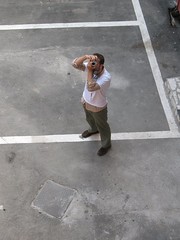 It is almost end of the Assembly. Soon we will go back home. We will go back to our churches. I will miss Sunday liturgy in my parish, but I knew that I will soon miss the ecumenical community we had here. We come from different Christian backgrounds and denominations but I feel that our understanding of what Christianity is, is very close. Probably we understand each other better the sometimes we understand others in our Churches. I am glad to have had the privilege of being here. I hope we will meet again. Thanks to all of you!
It is almost end of the Assembly. Soon we will go back home. We will go back to our churches. I will miss Sunday liturgy in my parish, but I knew that I will soon miss the ecumenical community we had here. We come from different Christian backgrounds and denominations but I feel that our understanding of what Christianity is, is very close. Probably we understand each other better the sometimes we understand others in our Churches. I am glad to have had the privilege of being here. I hope we will meet again. Thanks to all of you!
I've finished theology studies (like most of us), I work as a radio journalist, I am young husband from Warsaw Poland. My name is Mikołaj.
Publié par Jane à l'adresse 15:08 0 commentaires
Monica's blog
 Hi, Jane, and hi everybody
Hi, Jane, and hi everybody
my name is Monica and I was a steward in the press-team of the EEA3 in Sibiu. What can I say? I was delighted to be here to work with all the other stewards and especially with Jane, and believe me I do not say that just because she is here or that the others will eventually read my thoughts. It was an extraordinary experience which I will not forget soon. As a steward I realized these days all the efforts that staff people do in order to put everything in its place, I've seen so many people around me who tried their best to really make everything work. I did my best to fulfill my obligations as a steward and I hope that my boss was pleased with my work. I really felt important these days because I did something for the other human kinds and I think this is the real ecumenism.
There are so many other things that I would like to tell you but I will stop here, wishing you all the joy in the world and may God fulfill all your good thoughts.
with lots of love, Monik
Publié par Jane à l'adresse 11:47 0 commentaires
Natalka's blog
 Jane was so kind to invite me to write in her blog. I am a steward in the press-office she runs at the Sibiu Third European Ecumenical Assembly.
Jane was so kind to invite me to write in her blog. I am a steward in the press-office she runs at the Sibiu Third European Ecumenical Assembly.
Actually I am a blogger with long experience from 2002. You can see my blog here: http://burbalka.livejournal.com
I write about church and society in Belarus, about my daily experience, about people I meet.
Some how my blog is also of life, laughter and liturgy.
Publié par Jane à l'adresse 11:13 0 commentaires
Eva-Liisa's blog
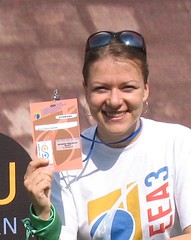 Pink is the colour...
Pink is the colour...
Working for first time as a steward in CCEE/CEC meeting. What to expect?
a word "chaos" has been said and heard several times in the press centre.
Working here has developed some creativity even though not all our tasks are creative in the essence :) the ones who`ve been there know :)
Question: how to divide 30 full boxes of copies paper by paper among 300 journalists in the most efficient, funny, quick, energy-saving etc way?
Answer: just start from number 1 up to number 300 and continue doing so until all the boxes are empty. Well, almost empty. it may turn out that copy-guys have been really enjoying their work as well and made some extra;)
Do not think much while dividing the papers, it may be confusing and in the end you will find yourself in the puzzle of some existential questions. Singing is allowed though!
It has been great pleasure to work for the press centre. honestly.
we had wonderful team and even more wonderful Jane. Thank you for everything :)
Eva
Publié par Jane à l'adresse 11:12 0 commentaires
Christelle's blog
 bonjour
bonjour
je m'appelle Christelle. C'est la premiere fois que je suis steward et c'est une expérience extraordinaire que je recomande à tous ceux qui ont le goût du voyage, qui aiment découvrir de nouvelles cultures, à tous ceux qui n'ont pas peur de la nouveauté et qui souhaite s'enrichir.
Grâce a ce voyage j'ai pu decouvrir la Roumanie, amméliorer un peu mon anglais (ce qui est indispensable ici), faire la connaissance de personnes formidables (je fais allusion aux autres stewards, aux personnes qui ont organisé cette rencontre, mais également a toute l'équipe du staff qui nous ont fait entré avec douceur dans le monde du travail)
Merci Jane pour cette approche du journalisme, elle a été extremement enrichissante pour moi car c'était la premiere fois que j'assistais à une conference de presse, et que je faisais un travail plus valorisant que ce dont j'ai l'habitude. J'ai adoré être a l'accueil et pouvoir "aider" les journalistes pour des petites chose, mais ce sont les petites choses qui font le tout.
Encore merci pour cette experience et pour ne pas avoir fait de différence lorsque j'ai annoncé a tous que je n'étais pas chretienne. L'ouverture d'esprit et la gentillesse des personnes travaillant ici et des jeunes steward ont été pour moi, les deux plus agréables suprises.
Aurevoir a tous et j'espere avoir de vos nouvelles de temps en temps
bise
Publié par Jane à l'adresse 10:58 0 commentaires
An italian Steward
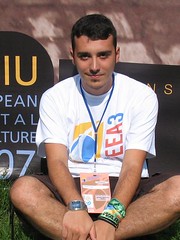 Salve a tutti,
Salve a tutti,
sono Andrea Vanni, vivo a Roma e studio Scienze Politiche all'universita' "Sapienza" di Roma.
Questa è stata la mia seconda esperienza come steward, infatti ho già lavorato come steward nel 2003 a Trondheim (Norway), alla Conferenza delle Chiese Europee.
Al pari di quella "norvegese", questa di Sibiu è stata una magnifica esperienza, in quanto ho avuto ancora una volta la possibilità di conoscere moltissimi ragazzi, le loro culture, le loro esperienze, il loro modo di vivere e pensare; inoltre ho avuto la possibilità di parlare in inglese e mettermi alla prova.
Credo che il vero Ecumenismo sia quello che abbiamo vissuto durante lo Stewards Programme, vivendo a stretto contatto con coetanei cattolici, protestanti e ortodossi; il nostro unico pensiero è stato quello di stare insieme in serenità
e questo ci ha aiutato a pensarci come una squadra, un team, molto compatto, in cui ognuno aiuta l'altro nelle difficoltà e tutti insieme si lavora per un unico scopo.
Questa lezione di solidarietà e comprensione dobbiamo farla nostra e portarla con noi al nostro ritorno, ognuno nel proprio paese, cosi' che si possa trasmettere questo magnifico spirito, e combattere una volta per tutte razzismo, pregiudizi e ogni altro genere di discriminazione e odio.
Spero vivamente che questa esperienza ci possa essere utile, per combattere la battaglia per un Mondo piu' giusto e per una fratellanza dei popoli.
Andrea Vanni
Publié par Jane à l'adresse 10:26 0 commentaires
Rita's blog
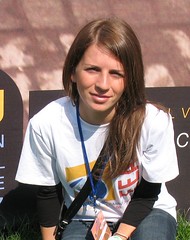 Ciao a tutti....!! Mi chiamo Rita, ho 22 anni e vengo dall'Italia (Sicilia). Qui, a Sibiu, ho partecipato alla EEA3 e faccio parte del gruppo degli steward che lavorano nel "press office". Per me è stata un' esperienza davvero fantastica. Ho avuto l'occasione di conoscere delle persone davvero gentili e simpatiche ed ho fatto amicizia con ragazzi di ogni parte.
Ciao a tutti....!! Mi chiamo Rita, ho 22 anni e vengo dall'Italia (Sicilia). Qui, a Sibiu, ho partecipato alla EEA3 e faccio parte del gruppo degli steward che lavorano nel "press office". Per me è stata un' esperienza davvero fantastica. Ho avuto l'occasione di conoscere delle persone davvero gentili e simpatiche ed ho fatto amicizia con ragazzi di ogni parte.
Il lavoro degli steward è stato molto interessante ma non è stato pesante... anzi.. La sola cosa che all'inizio mi ha un po' scoraggiato è stato il mio "inglese".. ma alla fine ho imparato tante nuove cose.
Spero tanto di poter ripetere un occasione del genere perchè è stata davvero fantastica!!!!
A presto...
Rita
Publié par Jane à l'adresse 10:10 0 commentaires
Grace's blog
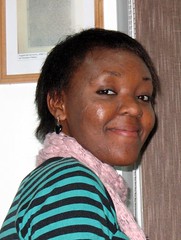 Hi, my name is Grace Muraa, I`m 19 and I worked as a steward at the press center. I come from Germany and I was very happy to have the possibility to come to Romania and serve as a steward. The work at the press center was never boring at all, since there was always a challenge and something new to do, whether it was the work at the Tent during the Plenaries or at the press center. This gave me the chance to enlarge and widen my knowledge, not only about how stressful a job at the Press can be but also about the way people learn to interact and work together, though not really knowing each other. And since I am planning to soon start my journalism studies, this was the best decision I could have taken.
Hi, my name is Grace Muraa, I`m 19 and I worked as a steward at the press center. I come from Germany and I was very happy to have the possibility to come to Romania and serve as a steward. The work at the press center was never boring at all, since there was always a challenge and something new to do, whether it was the work at the Tent during the Plenaries or at the press center. This gave me the chance to enlarge and widen my knowledge, not only about how stressful a job at the Press can be but also about the way people learn to interact and work together, though not really knowing each other. And since I am planning to soon start my journalism studies, this was the best decision I could have taken.
Generally the work as a steward has taught me how to cope with other people, whether you share the same views and interests or you absolutely don`t understand each other. I also have learnt lots of different things about the different cultures of the many people from the different parts of Europe. And basically, the best experience I have made is that we, all stewards, are the more or less the same. We might have different views, but we laughed together, prayed together and had fun together. It was a very good experience and I`m very happy to have made this experience in my age and I`m sure that this experience, as a steward and as a worker at the press center, will serve me positively for my future.
Publié par Jane à l'adresse 09:52 0 commentaires
Friday 7 September 2007
Videostar of the day - at the press conference
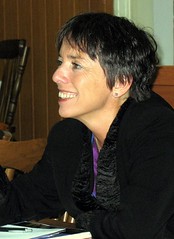 The youth blog elects a videostar of the day. Today Margot Kässmann was chosen because the way she chaired the morning's plenary session brought a really different atmosphere into the assembly - at last!
The youth blog elects a videostar of the day. Today Margot Kässmann was chosen because the way she chaired the morning's plenary session brought a really different atmosphere into the assembly - at last!
She and His Beatitude Archbishop Anastasios of Albania were two of the stars of today's press conference as were three young people - Yee Hung from Hong Kong and the UK, Andrej Banus from Romania and Natalka Vasilevich from Belarus. Although the starting point for the press conference was justice questions and answers ranged over many other areas - women's participation, the future of ecumenism, the need for the churches to say respect for human rights is a gospel value, recognising how difficult the situation still is in many European countries still stru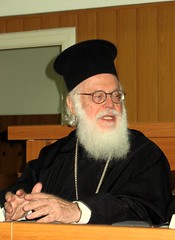 ggling to move towards more open societies.
ggling to move towards more open societies.
Archbishop Anastasios came up with a lovely image of the rainbow colours of the light of justice, stressing also that we should not let talk of justice blind us to the need to face with humility the very real poverty many in Europe live in.
Anyway, Natalka had quite a few interview requests and turned up in the press room rather exhausted a few hours later. In the course of our conversations she said that she has 600 subscribers to her blog - but she's been doing it since 2002. Must ask her for the link tomorrow - always supposing you can read Russian or Belorussian.
Publié par Jane à l'adresse 14:55 0 commentaires
Alternative Forum
The youth delegates and stewards are organising an alternative forum this afternoon at 15.30 in the youth café, Casa Teutsch, Str. Metropolei.
On the programme:
What happened to Graz (EEA2)?!
Where are the recommendations for action in Sibiu?!
Everybody welcome to share their experiences
No lectures, no words of greeting, but real discussions for everyone!
I would add - where did all the women go?
So even without a big representation of the groups some things are moving!
And in the meantime here's a link to Mikolaj's really great photos.
Publié par Jane à l'adresse 11:11 0 commentaires
The blogging bishop - she's certainly not tame
 Bishop Margot Kässmann who will be in our press conference today and who is chairing this morning's plenary discussions is also doing a blog from Sibiu - in German of course. It's great because she says what she thinks but is not over-critical either. She's obviously made an effort to get both to plenaries and a variety of the different hearings and events.
Bishop Margot Kässmann who will be in our press conference today and who is chairing this morning's plenary discussions is also doing a blog from Sibiu - in German of course. It's great because she says what she thinks but is not over-critical either. She's obviously made an effort to get both to plenaries and a variety of the different hearings and events.
She neatly weaves together political, spiritual, personal and institutional concerns. The WCC is just translating one of her recent books on spirituality - one of the tasks waiting for me when I return to Geneva.
One of the big differences between Sibiu and the other two European Ecumenical Assemblies (in Basel and Graz) is the fact that many of the grassroots groups are not here - given the accommodation problems we've experienced with the numbers who are here this is perhaps understandable. It does mean though that this assembly is much more top down and the agenda is not driven by concerns coming from activists. I'd also say that is very institutionally driven and the huge majority of keynote speakers are male.
Margot Kässmann says in her blog that because there were far fewer groups attending she felt the hearings were really rather "spartan" - even beautiful icons everywhere don't make up for a lack of human contact . When there are fewer people the energy levels are also very different and the views in discussions are often less diverse too.
I'll try and write a bit more about top down and bottom up ecumenism later on. I think it's a recurrent theme in many ecumenical meetings - is ecumenism a movement or a series of institutions?
Publié par Jane à l'adresse 09:10 0 commentaires
Libellés : blogging
Thursday 6 September 2007
On our way to and from beer this evening
 I've decided that blogging about all this marginally theological stuff is just an excuse- really all I'm actually blogging about is beer. It is so far the only recurrent topic! Now have a photo of the excellent local brew called Ursus.
I've decided that blogging about all this marginally theological stuff is just an excuse- really all I'm actually blogging about is beer. It is so far the only recurrent topic! Now have a photo of the excellent local brew called Ursus.
Anyway on our way to our beer and supper this evening with our friend Horst from Berlin, we bumped into Colin Williams and Jean-Arnold de Clermont and then some friends and former colleagues from the French Reformed Church and from the Eglise Evangélique Luthérienne de France. I told them I was following the French blog and they said that it would really worth reading in the morning - looking forwards to that! (I should add that the previous evening on our way to beer our friend Horst bumped into Wolfgang Huber, and Ishmael Noko was in the restaurant we ate in - the moral of this is  you must go out for an evening drink, it gives you better opportunites for name-dropping in your blog.)
you must go out for an evening drink, it gives you better opportunites for name-dropping in your blog.)
The main pedestrian street in Sibiu was full of lovely singing, in four part harmony from a delegation from one of the Baltic countries who were eating ice-cream.
But the highlight of the evening was bumping into Smaranda Dochia and some of the other stewards on our way back. Each of them was wearing rather splendid t-shirts in very refined and restrained professional navy-blue. The first one read "H.E. Metropolitan Gennadios (vice-president of CEC) started as a steward", the second one had the appropriate biblical quote and then "Martha started as a steward", the third one said on the front "Benedict started as a steward..." and continued on the back "and founded a whole order" and the final one said "Peter started as a steward ..." I'm not going to tell you what that said on th back - but it was worn by a young woman!!
The only disadvantage to going out for a late beer is that the bars were full of the journalists I'd been working with all day. Still can't complain too much, one of them is my husband.
Publié par Jane à l'adresse 23:10 1 commentaires
What we talk about in the press room
All sorts of conversations take place in the in the press room service area. Much that is desultory of course - chocolate and coffee - identifying VIPs attending the assembly on people's photo galleries. At various points there is also rather a surreal soundtrack from Giorgio's computer - music from West Side Story, Roman Holiday and the Merry Widow - takes me back to my childhood and musical theatre!
We do also talk a bit about our churches and today we ended up talking about Reformed theology and how things, objects and buildings are, in theory at least, not "sacred" for the Reformed. So for instance in the French Reformed Church you don't bless the wedding rings at a marriage service but you do pronounce a blessing over the couple who are getting married. So now I shall have to consult some online dictionaries about the difference between things that are  sacred and things that are consecrated.
sacred and things that are consecrated.
Anyway I digress, Natalka, one of our stewards, is also on the EEA3 message committee and she has been writing about her feelings and about human rights in Belarus and Russia and wondering why it's not more in evidence in discussions at the assembly. There are some really good posts on the youth delegates EEA3 blog so do support them with your comments and keep the discussion going.
Publié par Jane à l'adresse 17:54 0 commentaires
Press conferences ... it's all about profile
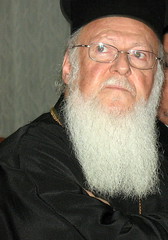 Press conferences at assemblies like this are always a bit chaotic. Things always over run and you're not sure if people will be free on time. Anyway we wanted to give all of the stewards in turn a taste of what it's like. Press conferences can be stressful enough just in one language - on Wednesday we were trying to work with five while only having interpretation equipment for three. Thank goodness the interpreters managed to cope despite only having a 16 minute lunch break.
Press conferences at assemblies like this are always a bit chaotic. Things always over run and you're not sure if people will be free on time. Anyway we wanted to give all of the stewards in turn a taste of what it's like. Press conferences can be stressful enough just in one language - on Wednesday we were trying to work with five while only having interpretation equipment for three. Thank goodness the interpreters managed to cope despite only having a 16 minute lunch break.
It really was a bit of a marathon - a double press conference starting with the Ecumenical Patriarch His All Holiness Bartholomeos I and then Bishop Wolfgang Huber, Cardinal Walter Kaspar and Metropolitian Kirill in the second. Metropolitan Kirill attacked modernity and stated that ecumenism as it is currently structured is in crisis.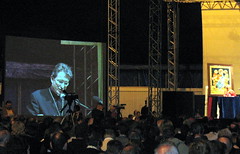 Huber and Kaspar must meet often both in Germany and beyond in these sorts of contexts. It was fun listening to them sparring with one another - rather lengthily in German. Though I do wonder whether anyone outside the German-speaking world really understands what the whole debate about profile-based ecumenism or ecumenism of profiles is all about. I spoke with Danish journalist Claus Vincents about this briefly today, he'd asked a question about it at the press conference. Ökumene der Profile is very difficult to translate, in my professional life I've officially approved "profile-based ecumenism" but as I see how this gets used journalistically I wonder whether I won't have to force myself to use two terms interchangeably or maybe go back to ecumenism of profiles - hmm we translators really try to avoid this so I'm just creating problems for myself really.
Huber and Kaspar must meet often both in Germany and beyond in these sorts of contexts. It was fun listening to them sparring with one another - rather lengthily in German. Though I do wonder whether anyone outside the German-speaking world really understands what the whole debate about profile-based ecumenism or ecumenism of profiles is all about. I spoke with Danish journalist Claus Vincents about this briefly today, he'd asked a question about it at the press conference. Ökumene der Profile is very difficult to translate, in my professional life I've officially approved "profile-based ecumenism" but as I see how this gets used journalistically I wonder whether I won't have to force myself to use two terms interchangeably or maybe go back to ecumenism of profiles - hmm we translators really try to avoid this so I'm just creating problems for myself really.
Thinking about it more theologically I realised that the two Reformed churches I come from have quite different takes on consensus or profile in terms of ecumenism. The United Reformed Church has written into its Basis of Union the idea almost that its own existence could give way to something else for the sake of wider church unity, more consensus, less profile. The Eglise Réformée de France, in some ways a much smaller church numerically than the URC, is much keener on providing specifically Protestant or Reformed perspectives on life. In a secularised context where the majority of Christians are Roman Catholic, having a distinctive Reformed profile and a commitment to being serious about faith, is one of the things that makes me proud of the ERF.
Anyway, enough theological musings for now. It is beer drinking time. I must throw the journalists out of the press room and let them and you know that tomorrow's press conference will be with His holiness Archbishop Anastasios of Albania, Bishop Margot Kässmann of Germany and two young people. More tomorrow on what their profile is.
Publié par Jane à l'adresse 16:39 0 commentaires
A few technical problems
 As you can see we have a fabulous array of specially made pigeonholes for documentation in four and sometimes five languages. On Wednesday we got our first delivery of documents direct from the printers, which was great until we discovered that instead of 60 copies of documents in French Italian and German we had 480 of each but on the four different coloured papers - probably as a result of a problem in translation. For greetings on one page this is not too bad but before we discovered the pr
As you can see we have a fabulous array of specially made pigeonholes for documentation in four and sometimes five languages. On Wednesday we got our first delivery of documents direct from the printers, which was great until we discovered that instead of 60 copies of documents in French Italian and German we had 480 of each but on the four different coloured papers - probably as a result of a problem in translation. For greetings on one page this is not too bad but before we discovered the pr oblem more than thirty documents had been printed – including some of 10 pages and more, so you can guess what the stewards have been doing all day – as well as everything else of course.
oblem more than thirty documents had been printed – including some of 10 pages and more, so you can guess what the stewards have been doing all day – as well as everything else of course.
Publié par Jane à l'adresse 16:35 0 commentaires
Libellés : Work
Tuesday 4 September 2007
My French colleagues are also doing a blog
The French delegates to Sibiu are doing a very informative blog in French about what is happening at Sibiu. It looks as if will provide a good link to documentation from the assembly in French - and it's rather better behaved than I am!
Publié par Jane à l'adresse 22:50 1 commentaires
Libellés : blogging
Speaking at the assembly on Wednesday ...
 Well on Wednesday morning at the first plenary the following people will be speaking: Cardinal Josip Bozanic, His All Holiness Patriarch Batholomeos, Rev. Anthony Peck, Evelina Martelli, Romanian President Trajan Bacescu, Sarah Numico, Monika Heitz, Cardinal Peter Erdo, Rev Jean Arnold de Clermont, Metropolitan Daniel of Moldova and Bucovina, ArchbishopIoan Robu of Bucarest, Bishop Laszlo Tokes, Cardinal Walter Ksper, Metropolitan Kirill of Smolensk and Kaliningrad, Bishop Wolfgang Huber and Rev Samuel Kobia. All that from 9.00 to 13.00 with a 15 minute break - and two eminent lay women, Ms Francine Wild and Dr Alison Eliot will chair the proceedings.
Well on Wednesday morning at the first plenary the following people will be speaking: Cardinal Josip Bozanic, His All Holiness Patriarch Batholomeos, Rev. Anthony Peck, Evelina Martelli, Romanian President Trajan Bacescu, Sarah Numico, Monika Heitz, Cardinal Peter Erdo, Rev Jean Arnold de Clermont, Metropolitan Daniel of Moldova and Bucovina, ArchbishopIoan Robu of Bucarest, Bishop Laszlo Tokes, Cardinal Walter Ksper, Metropolitan Kirill of Smolensk and Kaliningrad, Bishop Wolfgang Huber and Rev Samuel Kobia. All that from 9.00 to 13.00 with a 15 minute break - and two eminent lay women, Ms Francine Wild and Dr Alison Eliot will chair the proceedings.
I am very committed to ecumenism. I am also a feminist theologian. Hence the picture taken this evening at the opening action to honour the Very Reverend Magarathe Isberg - vice president of CEC, she is there, promise. Probably just a sign of how out of touch with things I am that I'm even concerned about such a peripheral matter.
Publié par Jane à l'adresse 22:05 0 commentaires
Libellés : Feminist theology
A great group of stewards
 One of the amazing privileges of attending assemblies like this is working with committed young people - I supose the older I get the more I realise what a privilege this is. We have a great group of 9 stewards working with us. Today they've been doing really essential work of carrying books and bags, welcoming and accrediting journalists, getting signage in the press room sorted out, buying water and chocolate for us all, helping the press liaison officers with identifying photos and posting them, helping journalists with finding their way around the Swiss keyboards and offering us IT support. to my shame I've still not learnt all their names but I will try to post some photos of them on the blog over the next few days.
One of the amazing privileges of attending assemblies like this is working with committed young people - I supose the older I get the more I realise what a privilege this is. We have a great group of 9 stewards working with us. Today they've been doing really essential work of carrying books and bags, welcoming and accrediting journalists, getting signage in the press room sorted out, buying water and chocolate for us all, helping the press liaison officers with identifying photos and posting them, helping journalists with finding their way around the Swiss keyboards and offering us IT support. to my shame I've still not learnt all their names but I will try to post some photos of them on the blog over the next few days.
They are also a linguistically very talented and diverse group and manage to communicate and get on wihtone another despite not haveing one common language - a true sign of the triumph of Pentecost over Babel!
Publié par Jane à l'adresse 21:53 0 commentaires
The first press conference
This afternoon was the first press conference and it was like an object lesson in the fact that English does not (always) rule the world. Proof also that sometimes international meetings forget the hosts - today there was no Romanian interpreter, but tomorrow there will be. It also convinced me once more that language and communication issues very often need to need to go hand in hand.
Anyway, the interpreters did a great job in very difficult circumstances, even translating someone who asked a question in a language Luca described as Italañol!
Jean-Arnold de Clermont (speaking in French) said that it was his hope that the assembly would have something powerful to say about the scandalous way many migrants and migrant workers were treated across Europe.
Aldo Giordano said that people hadn't come to Sibiu to discuss the intricacies of Vatican documents but to experience and celebrate grassroots ecumenism which was much more important. This time Christians were able to share together was truly a time of grace.
Colin Williams said that he hoped that the assembly would help give Christians renewed confidence about their faith and and give a fresh impetus to ecumenism.
Publié par Jane à l'adresse 15:48 0 commentaires
Libellés : Work
Monday 3 September 2007
Calligraphy, Calvin and the sublime
On the evening before we left Ferney Voltaire we went out for a beer with John and Tom Cochrane. When Tom's older brother Jonathan was 7 I taught him in Sunday School back in Redditch. Now Jonathan is the artistic director of the palace theatre and Tom has just moved to Ferney Voltaire because he will be doing research into the sublime at one of the institutes linked to the university in Geneva. I'm not sure I quite understood the philosophical importance of researching the sublime. Well I was very tired and rather stressed that evening, but I love the idea of an institute looking into the sublime.
Meanwhile I've just received a fascinating proposal from Edouard Dommen about doing some calligraphy of aphorisms by Calvin for a small book to come out in 2009. I'm fairly sure that I'm not at all a good enough calligrapher to do this, my wonderful teacher Sophie Verbeek would be but she may be tied up at the moment. Anyway even thinking about a creative project is a good way to relax on the eve of a busy day in the Sibiu press room. Not quite sure what Calvin thought of the sublime - is there a chapter on that in the institutes?
Publié par Jane à l'adresse 22:43 0 commentaires
Libellés : calligraphy, Life
Notes from a philosophical press room?
Today was our set up day in the press room. Last night we were particularly impressed by the imposing bust of a scholarly gentleman whose wrtings are also displayed on the wall of our press centre. One of my colleagues described him as a writer and philosopher. His name is Nicholas Olahus and he certainly had a fascinating life, writing treatises in Dutch, spending time in the Netherlands prior to becoming an Archbishop. He also seems to have been a keen proponent of the Counter Reformation. Not sure that I shall find his white marble gaze quite so benevolent in the morning now I know that!
Life in the press room today has really been about trying to live in hope and pull a semblance of order from something that may seem like chaos, but which we know will in the end become an ecumenical assembly. One of the highpoints was the arrival of the pigeonholes - freshly made for our 300 journalists. Now I just hope we will have some papers to put into them! Our photocopier hasn't yet arrived. But it does look like we will have have badges tomorrow for all of the journalists who need to sort out their accreditation. Phew!
Late this afternoon our nine wonderful stewards arrived, many of them with very impressive spreads of languages, with them they brought copies of the assembly handbook hot off the presses. I think the best way to talk about this is to say that an assembly on split sites brings it's own challenges and advantages! We live in hope that it will not be pouring with rain just as we need to carry paper documents from the Faculty of Orthodox Theology to the press room.
And do visit the Sibiu stewards blog. None of these ecumenical and church gatherings could take place without the enthusiasm and sheer hard work of young volunteers like them.
Publié par Jane à l'adresse 21:40 0 commentaires
Libellés : Work
The romance of travelling by train
I love travelling by train across international borders. Standing at the Gare du Nord or or de l'Est or de Lyon in Paris I love looking at the departure boards and dreaming about just getting on the train and going to Vienna or Berlin or London or Milan.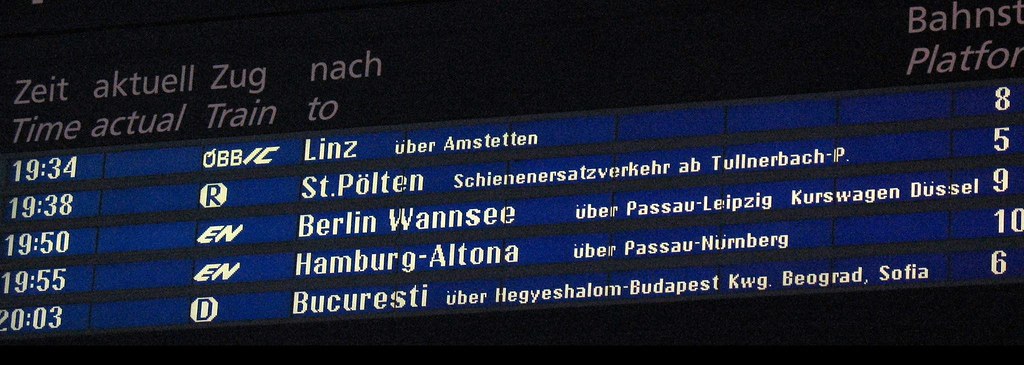
Railway stations are always slightly seedy places but I love the press of people and luggage and the fact that I'll be going somewhere. When I get on a train to another country I remember so many other crazy train journeys I've made in the past. In Zurich and Vienna on Saturday the train destinations were even more alluring and romantic: Bucarest, Budapest, Wroclaw, Venice...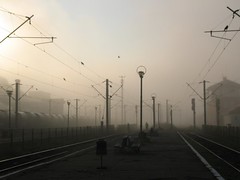 We travelled by train to Sibiu.
We travelled by train to Sibiu.
It took a long time - 27 hours - it was tiring and occasionally a little too exciting (jumping off our wagon lit at 6.30 in the morning down onto a non existent platform on arrival in Romania was rather more athletic than I was expecting!).
But above all it was fun, interesting and for me much more relaxing than travelling by air. Waiting for our connexion in Vienna we ate a proper Wiener Schnitzel and drank fabul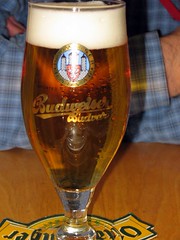 ous Czech Budweiser Budvar. I promise after tasting real Budvar you'll never want to drink that pale US drink called Bud. (And no I'm not going to put up a link to their website!)
ous Czech Budweiser Budvar. I promise after tasting real Budvar you'll never want to drink that pale US drink called Bud. (And no I'm not going to put up a link to their website!)
And of course if you do have to get up horribly early to catch your train, breakfast still tastes better in the restaurant carriage than on the plane. Proper table, with fabulous changing scenery and freshly made tea or coffee. Travelling this way has class; it's romantic and sensual; you meet interesting people, noisy school children and packs of mountain hikers; and your carbon footprint is much lower than travelling by air or car. More of that later. The downside to the train? In a word: luggage. No matter how hard I try I always pack too much. However as I looked out of the window this morning I realised that as usual I needed the one item I had chosen not to bring - my umbrella! We came to Sibiu and the Romanian heatwave ended abruptly, but at least the rain means we can approach the pre-assembly organisational chaos with slightly cooler heads. Here's hoping!
Publié par Jane à l'adresse 11:05 0 commentaires
Sunday 2 September 2007
Basel, Graz, Sibiu ... an ecumenical pilgrimage
This is the third European Ecumenical Assembly - hence EEA3.
It all began in 1989 in Basel. At that event participants went on a walk of witness for peace through three countries - France Germany and Switzerland. Just six months later the Berlin wall came down and post second world war Europe changed again.
EEA2 took place in Graz in 1997 with the theme of reconciliation.
And now here we are in Sibiu - stating that the light of Christ shines on all.
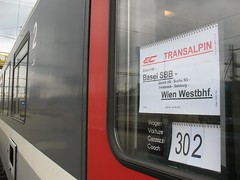 The train we caught in Zurich to get to Sibiu had come from Basel. Although we travelled the whole length of Austria we didn't go quite as far south as Graz, but on the last stretch to Sibiu a young Catholic student from Graz joined us. He'd been studying Orthodox theology for a year in Sibiu and had come back especially for this event. His sort of enthusiasm is just what's needed for the ecumenical pilgrimage to go forwards.
The train we caught in Zurich to get to Sibiu had come from Basel. Although we travelled the whole length of Austria we didn't go quite as far south as Graz, but on the last stretch to Sibiu a young Catholic student from Graz joined us. He'd been studying Orthodox theology for a year in Sibiu and had come back especially for this event. His sort of enthusiasm is just what's needed for the ecumenical pilgrimage to go forwards.
Publié par Jane à l'adresse 20:41 0 commentaires
Libellés : transport

